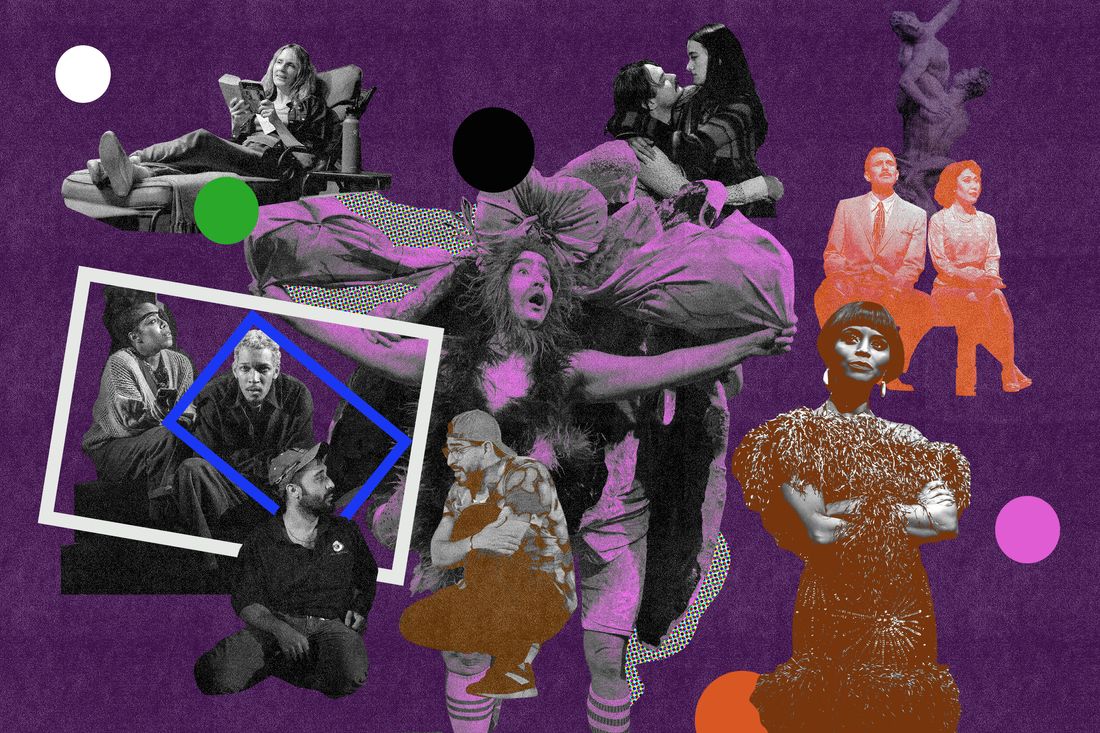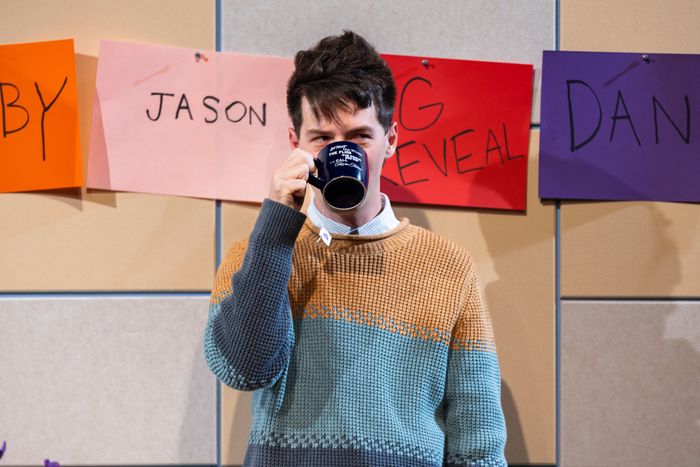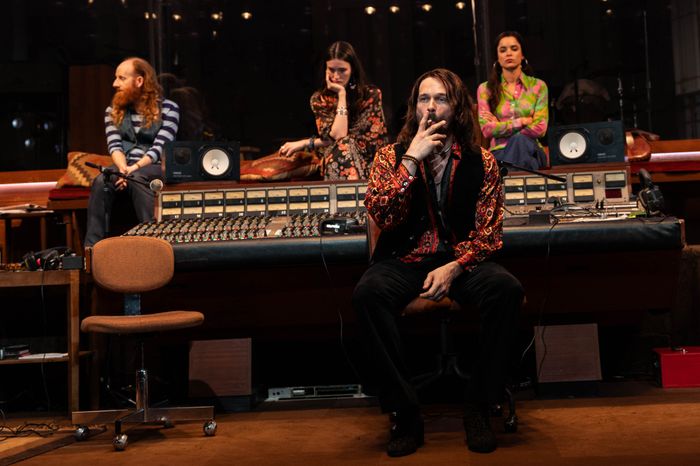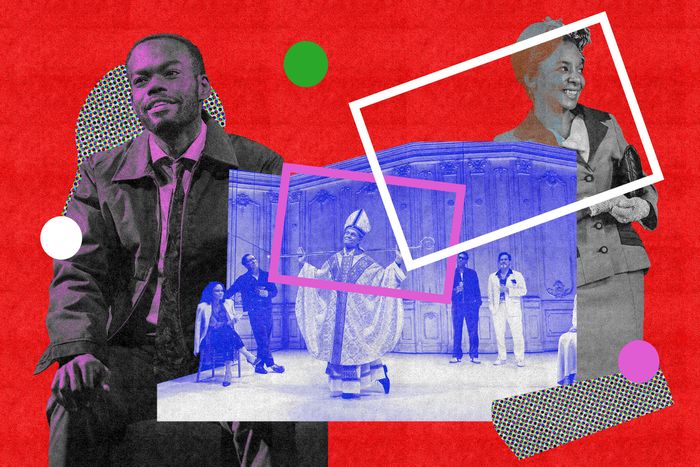
It’s the listiest time of the year! And now, with two critics on the theater beat, you get 20 top picks for the price of 10. Sara Holdren and Jackson McHenry sat down to chat about what theater excited them most, and before you head to their full conversation, here are their 2023 favorites, from Irish classics and clowning vaginas to Sondheim, satire, AI, and Adjmi.
Sara Holdren’s Top 10 Shows
10.
DruidO’Casey
Director Garry Hynes co-founded Galway’s Druid Theatre in 1975, and under her direction, it’s still mounting epic ventures into the work of great Irish playwrights, most recently in this rigorous and beautifully acted daylong marathon of Sean O’Casey’s fiercely funny, ultimately devastating Dublin Trilogy. In taking on The Plough and the Stars, The Shadow of a Gunman, and Juno and the Paycock, Druid’s wonderful ensemble brought out the plays’ sharp humor, their defiant centering of the poor and politically disenfranchised, and their clear poetic resonance — at once gorgeous and terrible — in our own fractured, brutal ’20s.
9.
Prometheus Firebringer
In this deceptively calm “lecture hybrid performance” by the writer and director Annie Dorsen (who’s also the only living thing onstage), theater comes face-to-face with the singularity — and survives. Dorsen has been making a series of “algorithmic theater” pieces, investigating the already omnipresent nature of AI in our day-to-day lives, in our art, in our brains. Here, she asked GPT-35 (the AI model that runs ChatGPT) to create possible versions of the lost final play of Aeschylus’s Prometheia trilogy. The bot was right up there with her, in the form of an AI-produced chorus of voices emanating from a series of AI-designed masks, speaking text that GPT-35 was generating on the spot. But Dorsen herself was by far the most fascinating thing onstage. Cobbling her lecture together word by word and sentence by sentence from myriad sources — “borrowing” verbatim just like AI — she made a sly, generous, and deeply eloquent case for human effort, human discernment, and human beauty.
8.
Purlie Victorious
Ossie Davis wrote and starred in this wily satire of the Jim Crow South more than 60 years ago, but in the nimble hands of director Kenny Leon’s actors — especially the ultra-charismatic Leslie Odom Jr. and the comedically revelatory Kara Young — the show felt sharper and bigger-hearted than plenty of contemporary plays. Odom Jr. sparkled as the title character, an aspiring reverend with a trickster spirit who returns to his Georgia hometown to win back the church that’s been unjustly seized by Ol’ Cap’n Cotchipee, the linen-wearing, Confederacy-worshiping tyrant with the big white house on the hill. And as Purlie’s wide-eyed, rubber-limbed protégé, Lutiebelle Gussie Mae Jenkins, Kara Young gave the kind of performance that should be on acting-class syllabi — rooted, fearless, and funny as hell.
7.
Translations
It’s been a great fall for muscular ensemble-driven drama, and the first production in the Irish Rep’s yearlong “Friel Project,” Doug Hughes’s Translations, was an unassuming triumph. Funny and tragic, soaringly lyrical yet unsentimental, Friel’s 1980 play about the British army’s visit to the fictional village of Baile Beag in the 1830s — sent on an imperialist mission to redraw the map of Ireland and Anglicize its place names — felt fresh and full of complex poignancy. Hughes’s lucid production was an exceptional showcase for its actors, from Seán McGinley as Hugh, the poetic-souled old schoolmaster, to Owen Campbell as his loving, frustrated son, Manus, to the luminous Mary Wiseman as “curly-headed Maire,” the woman Manus loves whose heart yearns elsewhere.
6.
Waiting for Godot
It’s also been a great fall for Ireland! Although, in Arin Arbus’s vigorous, earthy production of Beckett’s 1953 masterpiece, it felt like Vladimir and Estragon were doing their waiting on the side of a former trucking route somewhere in the dusty middle of what was once America. As Didi and Gogo, Paul Sparks and Michael Shannon brought the play’s humor and its humanity to the fore in a pair of gutsy and charmingly distinctive performances. They made Godot feel like a play about a marriage — with all its shorthand and tedium, its affection and its frustrations — and a curmudgeonly warmth accumulated around them on the chilly roadside, without undermining the play’s ageless encounter with the abyss.
5.
Snatch Adams & Tainty McCracken Present It’s That Time of the Month
The brazen, ebullient brainchild of the terrific actor-writer Becca Blackwell, Snatch Adams delighted not only with the anarchic antics of its talk-show premise (Snatch is a six-foot-tall talking vagina, hosting a variety show with her below-the-belt buddy, Tainty, a wise-cracking perineum), but also, and more surprisingly, with the pure, sweet heart underneath its splatter and glitter. Curious, generous, and joyful, Blackwell’s show — written and performed with the literally ballsy Amanda Duarte — felt like a bracing exorcism of the demons of shame, sanctimony, and irony. It was the messy, gloriously heart-open Magic School Bus trip that I didn’t know I needed.
4.
Merrily We Roll Along
Turns out the famously “broken” Merrily wasn’t anything a clear-eyed director and a bang-up trio of actors — dedicated to sincerity, vulnerability, and each other — couldn’t fix. Maria Friedman’s beautiful production played the show straight, letting Lindsay Mendez, Jonathan Groff, and Daniel Radcliffe expand its heart by three sizes. Groff was wrenching as the show’s compromised center, the brilliant sellout Franklin Shepard; Radcliffe swung for the fences as the nervy, endearing Charley Kringas; and Mendez — whose role as the quipping-and-tippling Mary Flynn can seem sour and underwritten — was grounded and radiant, quietly pouring her soul into “Like It Was,” leaving all of us far more broken than the play.
3.
Stereophonic
At this moment in our dance with the pandemic, it feels like theaters are still skittish about asking audiences to stick around for more than 90 minutes — so it was especially thrilling to spend three mesmerizing hours in the company of the ambitious, aspiring, sometimes cruel but always compelling bandmates who inhabit David Adjmi’s gorgeously crafted Stereophonic. With seven tremendous performances (including Will Brill as a squirrelly, substances-happy bassist and Eli Gelb as an earnest, increasingly disenchanted sound engineer), Adjmi’s Fleetwood Mac–inspired rock-and-roll epic delivered on every front, from Daniel Aukin’s drum-tight direction to the perfectly calibrated songs by former Arcade Fire member Will Butler. It was a hymn to the creative process, a loving and rigorous portrait of what it looks like to be addicted to art.
2.
Infinite Life
It’s Annie Baker, so it was divisive — people stomped out when characters began discussing their suffering bodies and gnawing desires in ruthlessly clinical detail — and I loved it. With the superb James Macdonald directing, Baker’s memory play about patients at a Northern California “water fasting” clinic was immensely confident, electrically charged yet serene, and, in the playwright’s inimitable way, both brutal and gentle. Marylouise Burke and Christina Kirk anchored an all-around stellar cast, who played Baker’s meticulous arrangement of language and negative space like a virtuosic sextet. Mortality sat facing us on a row of poolside lounge chairs, but it wasn’t alone. Curiosity and compassion sat there, too.
1.
School Pictures
Gentle, generous, seemingly simple in form but buzzing with complexity, writer-performer Milo Cramer’s solo show of songs inspired by the kids they taught during their five years as a New York City tutor was as riveting as it was sweetly funny. Armed with some construction paper, a ukulele, and a couple of keyboards, Cramer creates curious, complicated portraits of their former students, of themself, and of the institutions of teaching and learning that have shaped us, with or without our attention to the fact. As a confession of uncertainty, a quest for nuance, a celebration of these students — all on their own hard journeys — and a call to reexamine our encoded values, the show transcended its intentionally humble container. Its song will be in my head for a long time to come.
Jackson McHenry’s Top 10 Shows
10.
The Trees
Decidedly pastel and anticlimactic, Agnes Borinsky’s play had two siblings abruptly take root in a public park, then sit there in ambivalence as the world changed around them, for the better (in that they build a community of friends), worse (someone’s very interested in building a shopping mall around them), and generally more strange (there’s a pack of wolves in the distance). A metaphor for living in any number of present or future apocalypses, one whose calmness is all the more unsettling.
9.
How to Defend Yourself
Setting a play around a group of college students enrolling in a self-defense class gives you a ready-made way to get at the anxieties about consent that fill op-ed pages. Liliana Padilla’s script, which they directed with Rachel Chavkin and Steph Paul, entered the fray with full-tilt humor and generosity toward its characters, who all have different relationships to sex and fumble to articulate their own needs as much as they struggle to master their own bodies.
8.
Fagtasia: Wicked
If you really want to understand a big-budget long-running musical, it helps to see it performed in drag in the middle of the night in Bushwick. The “Fagtasia” series, which stages reenactments of various camp classics and is organized by Baby Love (who played Glinda), made the genius move of taking on Wicked, hewing close to the Broadway version’s staging but with its own delirious edits (no goat professor, lots of dildo jokes). No theatrical event I’ve seen this year has been more memorable than watching Charlene rise to the ceiling in a cherry picker draped in black cloth as people threw dollar bills at her during “Defying Gravity.”
7.
Primary Trust
We’ve gotten a lot of plays that channel the emotional frequencies of the pandemic, and are probably due for even more, but with her play about a loner bookstore employee on the hunt for a new job, Eboni Booth hit on a particular kind of loneliness that’s stuck with me. There’s so much about the little ways people comfort themselves and block out the world caught up in its scenes of William Jackson Harper conversing with his imaginary friend (Eric Berryman) over tiki cocktails.
6.
Wet Brain
On the flip side of the quietude of Primary Trust lies the manic energy of Wet Brain, John J. Caswell Jr.’s play where a trio of adult siblings attempt to take care of their alcoholic father who may also have had an encounter with alien life. The play’s relentless, the characters brutal to each other in the way family members who know each other too well can be, but after smashing all their anxieties together, it arrives at a strange, moving, sort of hopeful dénouement. Maybe there’s healing to be had for us all, if only in outer space.
5.
The Light in the Piazza
I don’t quite understand how Ruthie Ann Miles managed to go from her backbreaking (and show-stealing) role as the Beggar Woman in Sweeney Todd to Piazza, but I’m very thankful she did. As an American mother trying to protect her developmentally disabled daughter (newcomer Anna Zavelson, also excellent) on vacation to Florence, Miles was all poise, with a fault line of heartbreak running through her crisp mezzo-soprano. Her performance of the show’s finale, “Fable,” where Margaret reckons with all she’s cut herself off from and tries to rejoin the world, was the kind of thing that rends you in two.
4.
Infinite Life
Yes, Annie Baker’s new play had a great ensemble of actors playing women on a California wellness retreat, yes, the direction was finely honed, and yes, the dialogue was funny … and full of eerie pauses (it’s an Annie Baker play!). But what stuck with me most has got to be the lighting (by Isabella Byrd), which would shift from the dead of night to the glare of a sunrise, or vice versa, between conversations, forcing you to squint and blink and constantly, literally readjust your focus. What better way to underline the ask that you sit with these women and pay close attention?
3.
The Comeuppance
An A-plus ensemble of Off Broadway heavy hitters (Brittany Bradford, Caleb Eberhardt, Susannah Flood, Bobby Moreno, and Shannon Tyo) playing former high-school overachievers, sitting in the dark getting drunk and reflecting on death. Branden Jacobs-Jenkins took on the millennial present moment head-on — everyone’s pregaming a 20-year college reunion, talking about the pandemic, the insurrection, and even their memories of 9/11 — with a few intrusions from the actual god of death. Done without an intermission, to its own advantage, The Comeuppance resembled a descent into the underworld, a plunge into the abyssal depths of the collective psyche.
2.
Merrily We Roll Along
Everything about Merrily keeps you looking backward: The show runs in reverse, everyone talks about its flop original run, and even this production (and especially “Opening Doors”) gets you thinking about the history of Stephen Sondheim’s career, just a year after his death. But what Maria Friedman does that works so well is keep Merrily in the present: We stay in Franklin Shepard’s house the whole time even as we go back in time, never allowed to forget where this will all end up (in California … boo hiss!). Yes, the cast is incredible (Jonathan Groff, Daniel Radcliffe, and especially Lindsay Mendez will all break your heart — and Krystal Joy Brown will serve you great showbiz panache), but there’s a blunt effectiveness to Friedman’s vision that propels the whole thing, alongside some of Sondheim’s most gorgeous music — the way it is, always layered over the way it was, making you see the way it never, ever was.
1.
Stereophonic
There are so many surface pleasures to David Adjmi’s play about a 1970s rock band (that’s not not Fleetwood Mac) struggling to record an album: outfits that will make you long for a trip to a vintage-clothing store, music by Will Butler that’s actually good, thoroughly period dialogue about everything from Monty Python to gallon bags of cocaine. But all that texture and detail adds up, over the course of three hours, into a heartfelt but bleeding treatise on the act of collaboration, how totally gratifying and infuriating having to make art with other people can be. By the end of the show, relationships have ended, friendships are pretty much over, and most of the music we’ve seen the (annoyingly talented) cast perform has been cut from the album within the show, but hey, they actually made something. You’re left in awe that anything gets made, much less anything as good as Stereophonic.
2023 Brought Joyous Reactions to a Troubled World
Jackson McHenry: Okay, it’s that time: We’ve got to talk about Merrily We Roll Along.
Sara Holdren: Of course! We both have it on our lists — I mean, it’s been pretty universally praised.
JM: Who would’ve thought? I saw it in December last year Off Broadway, and it’s great to be so close with the performers, but once it got to Broadway it filled up the theater so well … The experience of watching it was, for me, also energized by seeing Sondheim’s Here We Are around the same time.
SH: Look, he made one last hat. I was happy it’s a weird, ambitious one. With a bear!
More From This Series
- The 10 Best TV Needle Drops of 2023
- The Weepiest TV Moments of 2023
- Our 78 Favorite Comedy Moments of 2023




